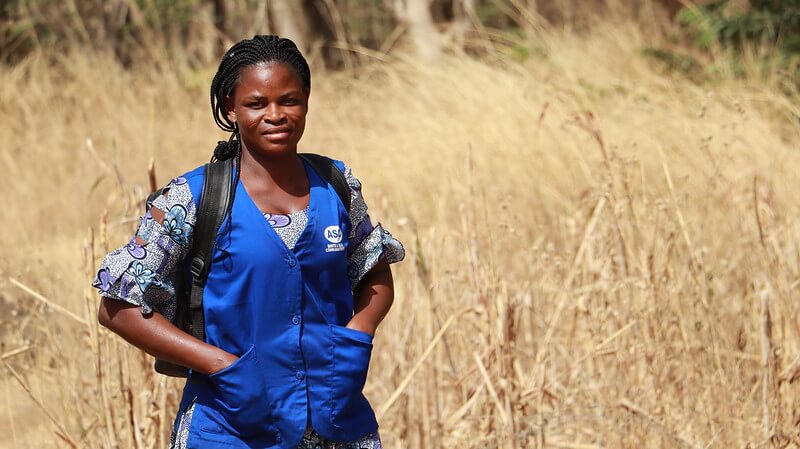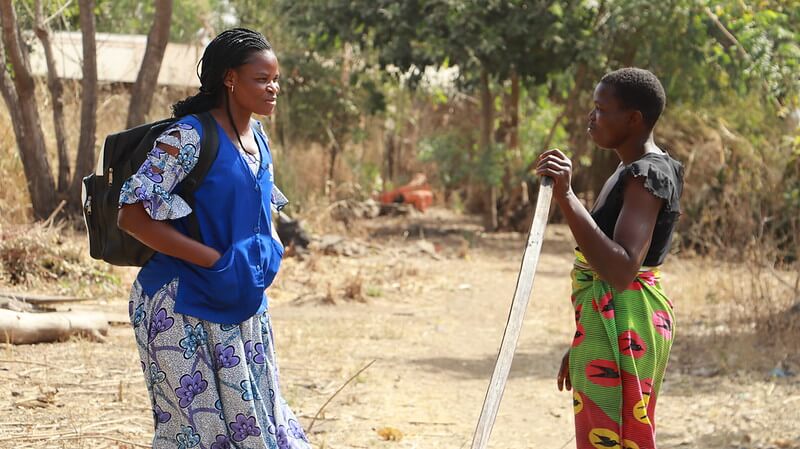Community Health Workers (CHWs) play a crucial role in healthcare delivery, acting as the primary point of contact with the healthcare system. In the remote communities of Togo and Guinea where we are active, ensuring continuity of care often marks the difference between life and death. Acknowledging this, we are equally committed to the wellbeing of the Community Health Workers we support, striving to ensure they achieve a healthy work-life balance. Given that the majority of our workforce are women, we prioritize supporting their specific needs, especially during major life events like maternity.
This is the case for N’danida N’danatche, an Integrate Health-supported Community Health Worker in the Kpindi community, Kozah district. N’danida became a Community Health Workers at just 23 years old and has since tirelessly served her community, spreading awareness and delivering healthcare to women and children. But today, she is enjoying some well-deserved rest, caring for and bonding with her newborn.
The importance of salaried Community Health Workers
As salaried employees, Community Health Workers like N’danida benefit from a fully paid maternity leave policy of 14 weeks. This policy ensures they have ample time to recuperate after childbirth and to focus on their newborn and postpartum recovery. Parenthood is challenging and far from a luxury, given the hormonal changes, recovery from childbirth, and sleepless nights. But for Community Health Workers who carry their equipment across difficult terrain, gender-responsive leave policies are absolutely essential.
“It’s nice to be able to take some much-needed rest. I spend some quality time with my family and my parents, and also make time for myself and my hobbies,” explains N’danida.
In the Kozah district where N’danida works, around 40 Community Health Workers were hired as full-time employees, playing a critical role in providing quality primary healthcare to women and children under five. Since they are salaried, they are entitled by law to 30 days of annual leave and 14 weeks of maternity leave. While this is a legal requirement that comes with their status, not every Community Health Worker has access to this right. Women in Global Health estimates that six million women work unpaid or underpaid in core health system roles, a gross underestimation according to the organization, which means a large part of this number includes unsalaried Community Health Workers. Additionally, the International Labour Organization estimates that one in three potential mothers across the world do not benefit from sufficient time off to rest and recover from childbirth. For us, employing salaried Community Health Workers isn’t just about pay, it’s about quality of life for women.
Maintaining continuity of care
The benefit of such policies does pose the challenge of maintaining continuity of care. Community Health Workers are indispensable to their patients, providing essential, sometimes lifesaving, services. Under these circumstances, taking a leave of absence can disrupt the vital services they provide. That is why at Integrate Health, we hire Community Health Worker replacements for each district we work in.
Kéméalo Halotolou is one of them, replacing N’danida during her maternity leave. Every time a new replacement starts, Kéméalo takes sufficient time to familiarize herself with every patient’s situation, ensuring the smoothest transition possible. She shadowed N’danida for a week, firstly to get up to speed on ongoing cases, and secondly, to introduce herself to patients and start gaining their trust. With the help of the Tonoudayo app, transitions have become easier. With every task and case logged, Kéméalo can easily continue ongoing care and treatments. She also met with the head of the local health center to discuss various priorities.

Kéméalo, having undergone the same training as N’danida, provides the same quality of care to patients. However, she explains that she always faces challenges in gaining the trust of a community accustomed to another’s care. “Building trust takes time, but it’s an opportunity to deepen the community’s confidence in our healthcare system,” Kéméalo recounts. “It’s about understanding that change can be hard and taking time. Once trust is earned, I’m called in for all sorts of reasons. I took this job because I want to serve my community, so I’m ok having to break a few walls,” she adds.
With Kéméalo stepping in with professionalism and confidence, N’danida was able to leave, reassured that her patients would continue to receive uninterrupted, quality care. While this replacement system requires additional resources, it offers quality of life and peace of mind to everyone involved.
Moving forward with commitment and care
The stories of N’danida and Kéméalo underscore the value of supported and salaried Community Health Workers. Our decision to allocate resources for fair compensation and essential social benefits, including maternity leave, stems from a commitment to our employees and the communities they serve. Adhering to this model involves meeting legal obligations and navigating complexities far greater than if we had chosen to employ volunteers.
Yet, opting for the easier route would have meant perpetuating patriarchal norms, exploiting women by leaving their work unpaid and unrecognized. While we acknowledge that we can always do better for our female employees, we consciously refuse to exacerbate the double burden of unpaid and unrecognized care on women who are the backbone of their health systems.

